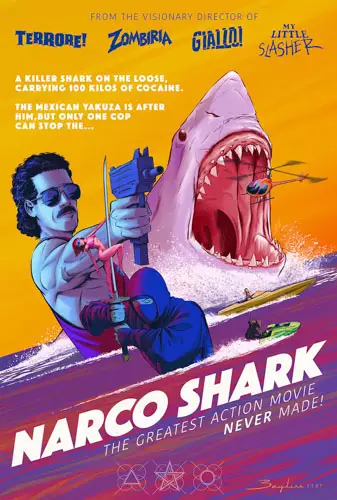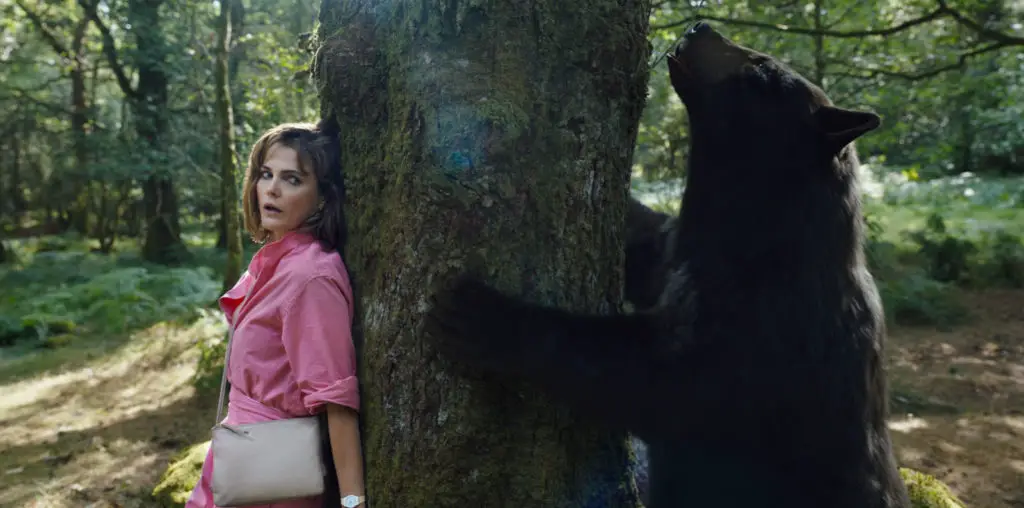
The sheer lunacy of writer-director Gerardo Preciado’s Narco Shark guarantees that cult midnight screenings or private viewings at home in whatever state of awareness you choose are not obsolete. It’s fun because the picture showcases a love for genre cliches and the filmmaking process that is one absurdist roller coaster of fun. The filmmaker includes meta-gags, as the opening set-up informs us that this is long-lost media that has finally been completed years and years later (this is all fake for the film’s purposes).
Set in 1989 Mexixo, the picture opens with a drug deal in broad daylight in an industrial ruin. Cartel members wear red ninja robes and spout the silliest of lines to their leader, the Gold Ninja. The deal goes wrong when the shark God, in the form of a human with a shark’s head, materializes and destroys everything. Ricky (Ricky Valente) is a saxophone-playing detective who makes it his mission to quell the ninja cartel and stop the evils of the cocaine-fueled shark, as both villains are leaving destruction and mayhem in their wake. His quest to smash the ninja cartel sees Ricky crossing paths with Sister Panda (Jose Francisco Arana), who dresses in full garb with black-and-white makeup and dispenses medical aid (pills) to sad people with migraines and demands “sugar” with an elongated tongue.
His home life is complicated, as the detective is trying to reignite the passion in his marriage to Tita (Cherry Lee) via some “hot sax time.” Ricky’s wife turns out to be a life-sized female store mannequin in a wedding dress who speaks in throaty tones about desiring his body without moving her mouth. The two are interrupted by Ricky’s shy, depraved brother-in-law Tito (Tico Suave). Tito looks like a combination of Mickey Rooney’s Asian landlord, Mr. Yunoshi from Breakfast at Tiffany’s, and Vito Scotti as a Japanese soldier. Tito lives in his room with no friends on a bed of VHS tapes that double as food when prepared.

“…makes it his mission to quell the ninja cartel and stop the evils of the cocaine-fueled shark…”
All the dialogue in Narco Shark is dubbed into English, but there are also subtitles throughout. It also features zany background music and occasional applause from a non-existent audience. Their inclusion aids in the intentionally schlocky nature of the finished product. CGI sharks flying out of the waves, breakdancing interludes, and people humping trees create a crazy, unpredictable atmosphere. Spectral alter egos of people that never die, large CGI heads on some people, and a script filled with zinging one-liners like “Never send a t******e to do a c**k’s job“ all make for one lunatic fringe excursion into fun. It’s an infectious spirit that will hit the right audience in the right way.
The film is shot in poor industrial areas and is similar to another intense experience in that it bombards the senses with crazy images, odd sounds, and genuinely deranged situations. The purposefully grimy cinematography mostly works, though delivering so bad it’s good intentionally is a tricky proposition. Too much wink-wink, nudge-nudge means it is more satire than schlock. On the other hand, too much polish breaks the illusion. For the most part, Preciado finds that happy middle ground and delivers something that is pure cult straight outta the box.
Narco Shark shares obvious influences with the guilty pleasures of the Sharknado series or any of the other oddly funny yet bloody send-ups that get folk to watch and then go, “Why did I watch that?“ Toss in 1990s Spanish cinema aesthetics with “chop socky“ fight sequences and gunplay from the Shaw Brothers and art house sequences, and one is left with an original experience for those who enjoy unpretentious trash fun.

"…an original experience for those who enjoy unpretentious trash fun."


